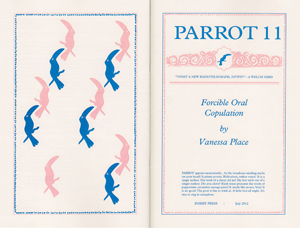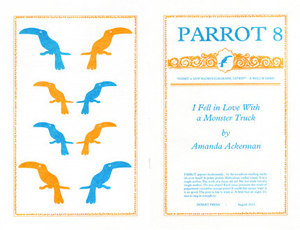How to Review Vanessa Place’s Forcible Oral Copulation
 Parrot 11: Forcible Oral Copulation
Parrot 11: Forcible Oral Copulation
by Vanessa Place
Insert Blanc Press (Parrot Series), 2012
18 pages / $9.00 Buy from Insert Blanc Press
1. You could just write a short summary of the chapbook, which is artfully arranged and darkly comic legal testimony of, no surprise, forcible oral copulation. You could mention that it’s part of Insert Blanc’s Parrot series, provide an excerpt like the one below, and write something to the effect of writing a review of Strict-Lift Conceptual Writing is sort of like writing a review of a rock: is it a good rock? Does it fulfill its implicit goals of being a rock? And so on.
When asked if he orally copulated his victims, appellant said he hadn’t; when asked if he’d forced his victims to orally copulate him, appellant said he hadn’t; later, appellant said maybe he had.
2. You could breeze through description and head straight into a discussion of Strict-Lift Conceptual Writing (henceforth SLCW), outlining the history and current state of it and then providing your opinion of it, writing maybe that unlike the more engaged conceptual writing found in great books like I’ll Drown My Book SLCW is sort of like the kind of joke that’s only funny the first time. The novelty wears off yet you keep hearing the same joke and you’re too bored to laugh so the joke-teller tries to confront you with titillating and/or shocking subject matter and you yawn because SLCW is SLCW is SLCW.
3. You could breeze through points numbers one and two and throw down a gauntlet maybe something like Forcible Oral Copulation would be right at home on Paul Ryan’s bookshelf next to his Rush Limbaugh books because SLCW is inherently neoconservative in its negation of creativity, complexity, and pleasure in favor of dumb objects. SLCW the opposite of Conceptual Art’s dematerialization, a fetishizing of the material and content-free vs. anything remotely avant or provocative, and you could maybe say that SLCW is not going to hurt you but it’s sort of like trying to swat a dead fly with a completely numb arm. You’d go on to shore up your dragging in of capital P Politics by paraphrasing Adrian Piper’s statement that all art is political, whether explicitly or implicitly, and you’d compare the production of SLCW unlike thrilling freeform conceptual writing as a shutting down of possibility, a reduction, conservatism in the literal sense and so in the political. Or maybe you’d avoid politics because SLCW is maybe the it-girl of the 21st century alt lit scene and knocking it would be like yelling back at the television in a room full of people who want you to shut up and just watch like a reasonable person or else leave quietly.
4. You could talk about your history as a rape survivor and wrap your discussion of Forcible Oral Copulation around its ability to do anything other than function as the outcome of an idea, simple curation that puts you on edge even though you’re supposed to be clinically distant and Over It anyway.
5. You could zoom through points one through three and go light on the politics in favor of discussing why conceptual writing, along with The New Sincerity, are relics of Bush-era willful ignorance because both SLCW and The New Sincerity are not sincere but naive in their fumbling mimicry of something past or lost and serve the purpose to present a literary angle of attack that reduces literature to something fundamentally unchallenging and unnecessary. You could maybe bring politics in at this point but maybe not.
December 17th, 2012 / 12:05 pm
Seven Parrots
The Parrot series, published by Insert Blanc Press, was much like its imprint started in a mess of pleasant confusion—my understanding is Insert was at first largely a fake press, that slowly became real—in that prior to the actual writing of each Parrot chapbook, they were simply descriptions of (fake) books by (real) authors to include in the entire fiction that is Insert Blanc; however, after a time, the authors of the (fake) descriptions of the Parrot books were asked to actually write them. What the real story is exactly I’m not particularly concerned. I received seven of the Parrot chapbooks—8-14—and for the past few weeks I’ve carried them around in my backpack, taking one out at random when a moment presented itself for a brief dose of whimsy and entertainment, and what follows will be my perceptions of each of them commingled with anything else I have inside my head upon reading.
Also, I’d like to note as an aside the mere pleasure of a well-made chapbook brought along with your other essentials day-to-day. These Parrots are very well-made, pleasing to look at, to hold, to flip through or to sit down mulling over as seriously as your favorite paperbacks. They call to mind not the muddled shelf of desperate/overwhelmingly-similar zines at any record store on the planet, but a sturdy, comfortable nook in a café where people actually give a shit about reading and are curious about the potentialities of language. Anyway, I digress, but really, I like these books a whole lot.
PARROT 8 ‘I Fell in Love With a Monster Truck by Amanda Ackerman’

As I was reading this, I began seeing a hunched decrepit figure in the periphery of my right eye, and it was terrifying so I stuck to the narrative at hand and by the time I was done the figure was gone, so that was good. I don’t want to use the phrase “prose poem” for as long as I live—quotations aside, I guess—so I’m not going to do that here but that’s kind of what this one is. These are chapbooks of poetry, in so many words, but this one reads like a brief Beckettian memoir of a young person who’s constantly being given workout advice at very inopportune moments and cannot fit through doors and constantly refers—as a Bartleby, of sorts—back to the phrase ‘I WILL NOT PROFIT FROM THE SUFFERING OF OTHERS’—and as a person on a couch reading this I realized that the title mattered in an indirect way but the guts and the language of the thing were compelling and confusing and intriguing and I kept reading—I like to think at the pace of the author while writing it, altogether manic and piling atop itself in fits of hilarity—and by the time it was done I knew I’d read a portrait of some life somewhere and that was good, too. Also, the Keith Haring-esque drawings throughout complimented the work better than most drawings throughout poems/stories tend to do; which is to say, they often don’t (do not) and perhaps only work 23% of the time…
December 17th, 2012 / 12:00 pm
